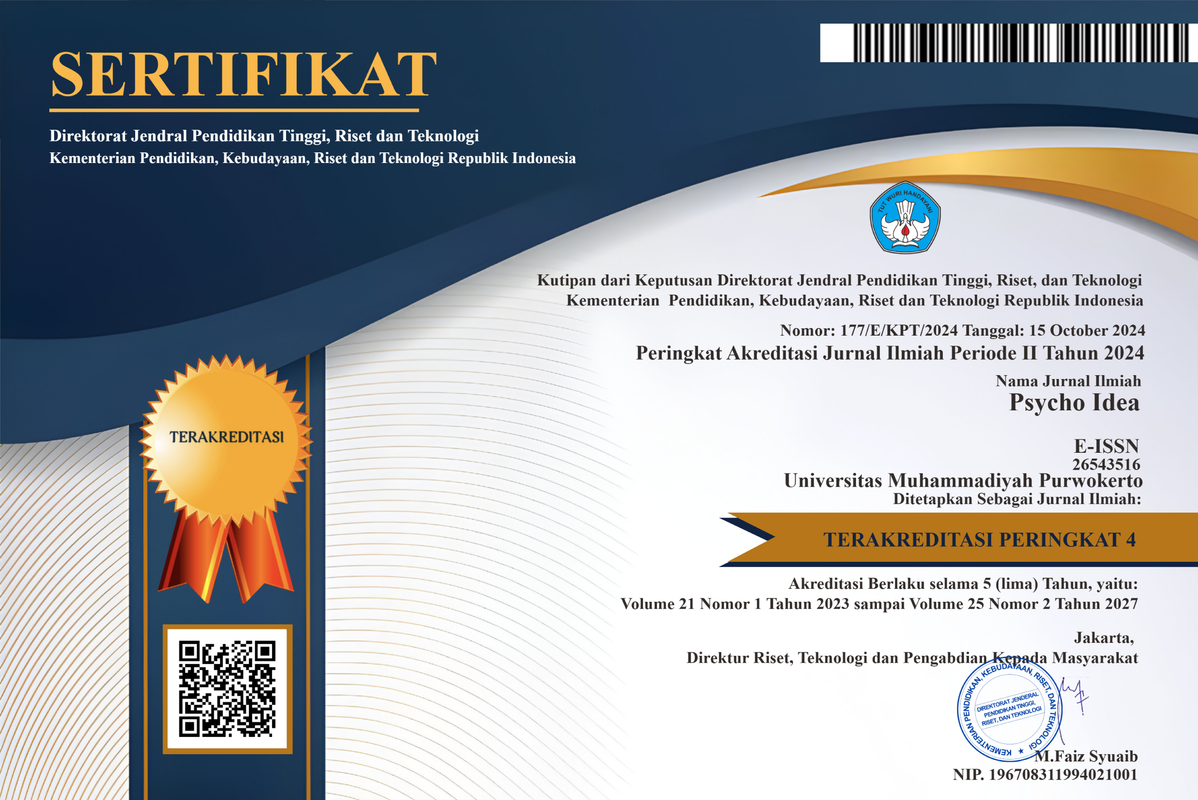HUBUNGAN ANTARA KECERDASAN EMOSIONAL DENGAN KEMATANGAN KARIR PADA MAHASISWA UNIVERSITAS MUHAMMADIYAH PURWOKERTO YANG SEDANG MENEMPUH SKRIPSI
DOI:
https://doi.org/10.30595/psychoidea.v11i2.508Abstract
Penelitian ini bertujuan untuk mengetahui hubungan antara kecerdasan emosional dengan kematangan karier pada mahasiswa Universitas Muhammadiyah Purwokerto yang sedang menempuh skripsi. Pengambilan sampel menggunakan teknik proportional random sampling yang berjumlah 113 orang dari 21 program studi. Metode pengumpulan data penelitian menggunakan instrument Skala Kecerdasan Emosional dan Skala Kematangan Karier. Analisis data dilakukan dengan menggunakan teknik analisis korelasi Product Moment dari Pearson. Hasil analisis data diperoleh = 0,549 dan = 0,185 ( > ). Hasil penelitian menunjukkan bahwa ada korelasi positif yang signifikan antara kecerdasan emosional dengan kematangan karier. Kata Kunci : kematangan karier, kecerdasan emosional, mahasiswaReferences
Armansyah. (2002). “Intelegency Quotient, Emotional Quotient dan Spritiual Quotient dalam membentuk perilaku kerja”. Jurnal ilmiah Manajemen & Bisnis. Vol. 02 No. 01 April 2002. Sumatera Utara : Fakultas Ekonomi Universitas Muhammadiyah Sumatera Utara
Brooks, L. (1990). Recent developments in theory building. In D. Brown and L. Brooks (Eds.), Career choice and development: applying contemporary theories to practice (2nd ed). San Francisco: Jossey-Bass.
Difabio, A dan Palazzeschi, L. (2009). Emotional Intellegence, Personality Trait, and Career Decision Difficulties. International Journal for Education and Vocational Guidance. Vol.9 135-146. http://www.spingerlink.com/index/4741v5p610847qmh.pdf. Diakses tanggal 28 Oktober 2010
Goleman, D. (2009). Emotional Intelligence (terjemahan). Jakarta : PT Gramedia Pustaka Utama.
Hadi, I. (2009). “60 % Lulusan Perguruan Tinggi Menganggur”. 16 Februari 2009. http://sapadunia.wordpress.com/2009/02/16/60-lulusan-perguruan-tinggi-menganggur/ Diakses tanggal 8 April 2010
Hami, A. (2006). “Gambaran Kematangan Karier pada Para Calon Sarjana dilingkungan Fakultas Psikologi Universitas Padjadjaran”. Hasil Penelitian Universitas Padjadjaran.
Hurlock, E. (1980). Developmental Psychology: A life span approach. (5th ed). New Delhi: McGraw-Hill.
Ingarianti, T. (2009). â€Hubungan antara Adversity Quotient dengan Kematangan Karier pada Remajaâ€. Hasil Penelitian Lembaga Penelitian UMM.
Lukas, A. (2005). The Relationship between Negative Career Thoughts & Emotional Intelegence. September 2005.
Napitupulu, E. (2009). “Lulusan Perguruan Tinggi Hanya Berorientasi Jadi Pencari Kerja”. Kompas. 11 September 2009. http://edukasi.kompas.com/read/2009/09/11/20374961/lulusan.perguruan.tinggi.hanya.berorientasi.jadi.pencari.kerja Diakses 8 April 2010
Patton, W. (2001). Developmental Issues in Career Maturity and Career Decision Status. Career development quarterly, June 2001.
Putri, R. (2009). “Dilema Kesesuaian Pekerjaan dengan Pendidikan dan Minat”. Vibiznews. 21 Januari 2009. HTTP://WWW.MANAGEMENTFILE.COM/JOURNAL.PHP?ID=169&SUB=JOURNAL&PAGE=HR&AWAL=40. Diakses 13 Oktober 2010
Sartika, D, (2002), “Hubungan antara Kematangan Karir dan Self Esteem pada Sarjana Baru UNISBA angkatan ke-3”. Thesis, (tidak diterbitkan) Bandung : Program Magister Fakultas Psikologi UNPAD.
Savickas, M. L. (2001). A Developmental Perspective on Vocational Behavior: Career Pattern, Salience, and Themes. International Journal for Educational and Vocational Guidance, 1, 49-57.
Seligman, L. (1994). Developmental Career Counselling and Assessment (2nd ed.).London: SAGE.
Yusuf, S. (2009). Psikologi Perkembangan Anak dan Remaja. Bandung : PT Remaja Rosda Karya.
Downloads
Published
Issue
Section
License
Authors published in this journal agree to the following terms:
- The copyright of each article is retained by the author (s) without restrictions
- The journal allows the author(s) to retain publishing rights without restrictions
- The author grants the journal the first publication rights with the work simultaneously licensed under the Creative Commons Attribution License, allowing others to share the work with an acknowledgment of authorship and the initial publication in this journal.
- Authors may enter into separate additional contractual agreements for the non-exclusive distribution of published journal versions of the work (for example, posting them to institutional repositories or publishing them in a book), with acknowledgment of their initial publication in this journal
- Authors are permitted and encouraged to post their work online (For example in the Institutional Repository or on their website) before and during the submission process, as this can lead to productive exchanges, as well as earlier and larger citations of published work
- Articles and all related material published are distributed under a Creative Commons Attribution-4.0 International Public License (CC - BY 4.0).
License
Psycho Idea is licensed under a Creative Commons Attribution- 4.0 International Public License (CC - BY 4.0).
You are free to :
Share — copy and redistribute the material in any medium or format
Adapt — remix, transform, and build upon the material for any purpose, even commercially











